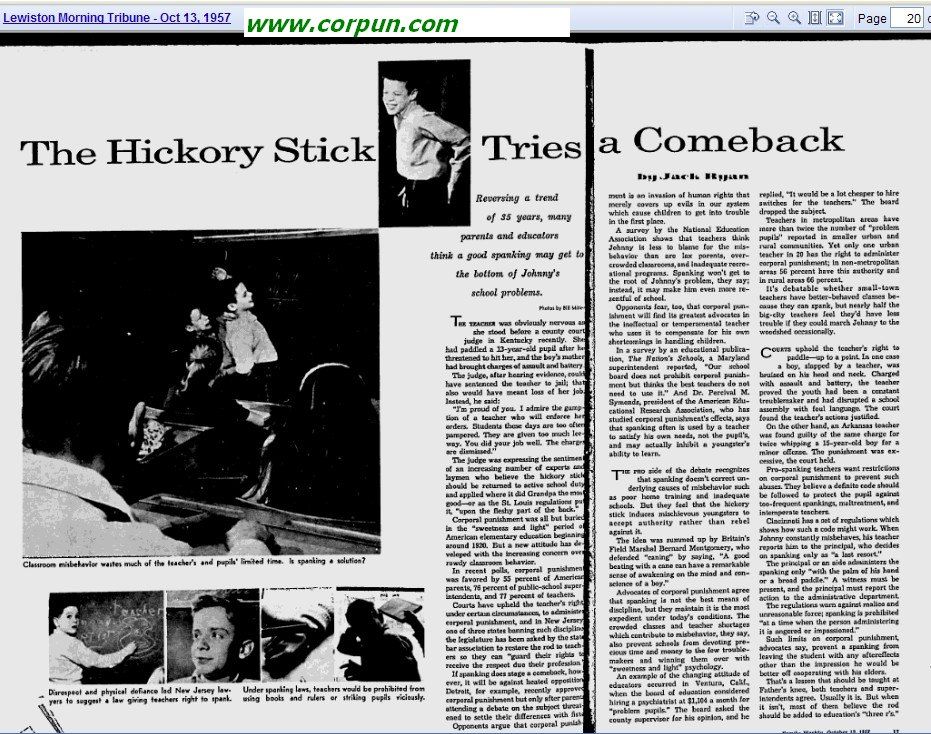|
Corpun file 22944
Family Weekly, 13 October 1957, pp.16-17 (Lewiston Morning Tribune, Idaho)
The Hickory Stick Tries a Comeback
Reversing a trend of 35 years, many parents and educators
think a good spanking may get to the bottom of Johnny's school
problems.
By Jack Ryan
Photos by Bill Miller
 THE TEACHER was obviously nervous as she stood before a county
court judge in Kentucky recently. She had paddled a 13-year-old
pupil after he threatened to hit her, and the boy's mother had
brought charges of assault and battery. THE TEACHER was obviously nervous as she stood before a county
court judge in Kentucky recently. She had paddled a 13-year-old
pupil after he threatened to hit her, and the boy's mother had
brought charges of assault and battery.
The judge, after hearing evidence, could have sentenced the
teacher to jail; that also would have meant loss of her job.
Instead, he said:
"I'm proud of you. I admire the gumption of a teacher who
will enforce her orders. Students these days are too often
pampered. They are given too much leeway. You did your job well.
The charges are dismissed."
The judge was expressing the sentiment of an increasing number of
experts and laymen who believe the hickory stick should be
returned to active school duty and applied where it did Grandpa
the most good -- or as the St. Louis regulations put it,
"upon the fleshy part of the back".
Corporal punishment was all but buried in the "sweetness and
light" period of American elementary education beginning
around 1920. But a new attitude has developed with the increasing
concern over rowdy classroom behavior.
In recent polls, corporal punishment was favored by 55 percent
of American parents, 76 percent of public-school superintendents,
and 77 percent of teachers.

Click to enlarge |
Courts have upheld the teacher's right, under certain
circumstances, to administer corporal punishment, and in New
Jersey, one of three states banning such discipline, the
legislature has been asked by the state bar association to
restore the rod to teachers so they can "guard their rights
to receive the respect due their profession".
If spanking does stage a comeback, however, it will be against
heated opposition. Detroit, for example, recently approved
corporal punishment but only after parents attending a debate on
the subject threatened to settle their differences with fists.
Opponents argue that corporal punishment is an invasion of human
rights that merely covers up evils in our system which cause
children to get into trouble in the first place.
A survey by the National Education Association shows that
teachers think Johnny is less to blame for the misbehavior than
are lax parents, overcrowded classrooms, and inadequate
recreational programs. Spanking won't get to the root of Johnny's
problem, they say; instead, it may make him even more resentful
of school.
Opponents fear, too, that corporal punishment will find its
greatest advocates in the ineffectual or temperamental teacher
who uses it to compensate for his own shortcomings in handling
children.
In a survey by an educational publication, The Nation's Schools,
a Maryland superintendent reported, "Our school board does
not prohibit corporal punishment but thinks the best teachers do
not need to use it." And Dr. Percival M. Symonds, president
of the American Educational Research Association, who has studied
corporal punishment's effects, says that spanking often is used
by a teacher to satisfy his own needs, not the pupil's, and may
actually inhibit a youngster's ability to learn.
The PRO side of the debate recognizes that spanking doesn't
correct underlying causes of misbehavior such as poor home
training and inadequate schools. But they feel that the hickory
stick induces mischievous youngsters to accept authority rather
than rebel against it.
The idea was summed up by Britain's Field Marshal Bernard
Montgomery, who defended "caning" by saying, "A
good beating with a cane can have a remarkable sense of awakening
on the mind and conscience of a boy."
Advocates of corporal punishment agree that spanking is not the
best means of discipline, but they maintain it is the most
expedient under today's conditions. The crowded classes and
teacher shortages which contribute to misbehavior, they say, also
prevent schools from devoting precious time and money to the few
troublemakers and winning them over with "sweetness and
light" psychology.
An example of the changing attitude of educators occurred in
Ventura, Calif., when the board of education considered hiring a
psychiatrist at $1,104 a month for "problem pupils."
The board asked the county supervisor for his opinion, and he
replied, "It would be a lot cheaper to hire switches for the
teachers." The board dropped the subject.
Teachers in metropolitan areas have more than twice the number
of "problem pupils" reported in smaller urban and rural
communities. Yet only one urban teacher in 20 has the right to
administer corporal punishment; in non-metropolitan areas 56
percent have this authority and in rural areas 66 percent.
It's debatable whether small-town teachers have better-behaved
classes because they can spank, but nearly half the big-city
teachers feel they'd have less trouble if they could march Johnny
to the woodshed occasionally.
COURTS uphold the teacher's right to paddle -- up to a point. In
one case a boy, slapped by a teacher, was bruised on his head and
neck. Charged with assault and battery, the teacher proved the
youth had been a constant troublemaker and had disrupted a school
assembly with foul language. The court found the teacher's
actions justified.

On the other hand, an Arkansas teacher was found guilty of the
same charge for twice whipping a 15-year-old boy for a minor
offense. The punishment was excessive, the court held.
Pro-spanking teachers want restrictions on corporal punishment to
prevent such abuses. They believe a definite code should be
followed to protect the pupil against too-frequent spankings,
maltreatment, and intemperate teachers.
Cincinnati has a set of regulations which shows how such a code
might work. When Johnny constantly misbehaves, his teacher
reports him to the principal, who decides on spanking only as
"a last resort."
The principal or an aide administers the spanking only "with
the palm of his hand or a broad paddle." A witness must be
present, and the principal must report the action to the
administrative department.
The regulations warn against malice and unreasonable force;
spanking is prohibited "at a time when the person
administering it is angered or impassioned."
Such limits on corporal punishment, advocates say, prevent a
spanking from leaving the student with any after effects other
than the impression he would be better off cooperating with his
elders.
That's a lesson that should be taught at Father's knee, both
teachers and superintendents agree. Usually it is. But when it
isn't, most of them believe the rod should be added to
education's "three r's."
| |
About this website
Search this site
Article: American school paddling
External links: Corporal punishment in US schools
Archive up to 1975: USA
Video clips
Picture index
|

![]()